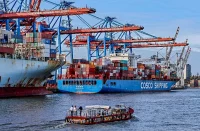
A high–level international conference on Afghanistan was held in Doha, the capital of Qatar, on June 30 and July 1, 2024. In addition to representatives of the Emirate of Afghanistan, 25 special envoys from different countries and UN officials took part in it. The Russian delegation was headed by the Special Representative of the President of Russia for Afghanistan, Zamir Kabulov.
This has been the third high–level meeting on the settlement in Afghanistan, which was taking place in Doha. However, the first one, which has been attended by official representatives of the Afghan authorities. They were not invited to the first event, which was actually supervised by the United States. Washington probably thought that after they were kicked out of Afghanistan in 2021, the Taliban movement would not last long, and it was possible to dream and plan something without their participation (probably, the organizers of conferences on Ukraine had the same motives without the participation of Russia). But, as has often happened before, such a plan did not work. The Taliban not only remained in power, but also gradually began to gain international legitimacy and establish ties. In February 2024, a second conference was convened at the initiative of the United Nations. But the Taliban boycotted it because they disagreed with the agenda, which included a specific Western interpretation of civil society.
Doha was not chosen as a venue by chance. The fact is that Qatar has long been a mediator for negotiations between the Taliban and officials from the United States, and in addition, the headquarters of the Palestinian Hamas movement is located there. Apparently, the effectiveness of this role is recognized not only in the West, but also in the East.
According to UN Secretary–General Antonio Guterres, the main goal of the third round of negotiations was to expand international cooperation with Afghanistan in a more consistent, coordinated and structured manner. Apparently, this has been achieved.
On the very first day of the event, the Taliban thanked Russia “for its positive and constructive position.“ The head of the delegation from Afghanistan, Zabihullah Mujahid, wrote about this on a social network. What is important is that the United States has repeatedly tried to prevent the improvement of ties between the Islamic Emirate of Afghanistan, as the Taliban now officially call their country, and the Russian Federation. This has not been achieved. And the political trust between Moscow and Kabul has reached a new level.
It is also known that on the very first day, the Taliban delegation held a separate meeting with Kabulov, but also with representatives of India, Saudi Arabia and Uzbekistan.
As for the results, according to official Afghan sources, “commitments were made at the meeting to lift economic and banking restrictions.“
Observers note that sanctions against Afghanistan will probably be lifted soon and accounts will be unfrozen. Since Mujahid praised the positions of not only Russia, China, Iran, Pakistan, Kazakhstan, Uzbekistan, Kyrgyzstan, Turkmenistan and the Organization of Islamic Cooperation, but also of the United States, this is an indirect confirmation of Washington‘s readiness to return assets to Afghanistan.
Nevertheless, it should be emphasized that if the United States is on this list, rather because of its role in freezing (and potentially) unfreezing of Afghan banking assets, then all other countries represent a collective non–West, which is indicative in the context of increasing multipolarity.
Therefore, the benefits of the potential in cooperation with Afghanistan will be received, first of all, by the countries of Eurasia. By the way, the Taliban have also expressed interest in participating in the work of the North–South International Transport Corridor, where Russia and Iran are key players. It is significant that Pakistan showed the same interest the day before.
And if the Taliban found more in common with the countries of the Global South and East during the Doha conference and were determined to cooperate in various fields, then differences at the level of diplomatic rhetoric immediately emerged with representatives of the West.
For example, UN Under–Secretary–General Rosemary DiCarlo again raised the issue of gender equality, although it had previously been agreed not to include it on the conference agenda. She stated that “the Taliban authorities” were told that women should be involved in public life and that “authorities will not sit across the table with Afghan civil society in this format, but they have heard very clearly the need to include women and civil society in all aspects of public life“. At the same time, she noted that the issue of sanctions was raised, but not considered in detail, as if hinting that it has not yet been resolved and may well depend on the solution of the gender issue.
Agnes Callamard, head of Amnesty International, said before the talks that “fulfilling the Taliban‘s conditions to ensure their participation in the negotiations could lead to the legitimization of their institutionalized system of oppression based on gender principles.“
Canada’s International Affairs Agency issued a press release expressing its disappointment that women from Afghanistan were not represented at the meeting.
At the opening of the summit, Taliban representative Zabihullah Mujahid laconically noted that diplomats should “find ways of interaction and mutual understanding, not confrontation,“ despite the “natural“ differences in politics. “The Islamic Emirate of Afghanistan also strives for constructive cooperation with Western countries,“ he said, adding that “like any sovereign state, we adhere to certain religious and cultural values and social aspirations that must be recognized.“
It should be noted that representatives of the Taliban movement have repeatedly stated that the rights of all citizens are guaranteed by Islamic law.
But the West has its own point of view and even coined the term “gender apartheid“ in relation to the situation in Afghanistan. Suffice it to recall that the same clever people in the West used to come up with “Islamic fascism“ in order to demonize the Islamic Republic of Iran, and later justify military interventions into Afghanistan and Iraq.
But their time is already running out. And now the West itself is becoming a gathering of rogue states. And Afghanistan, with its specific culture and Islamic law, is joining the commonwealth of sovereign powers.














Comments